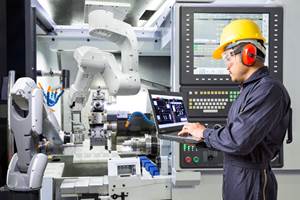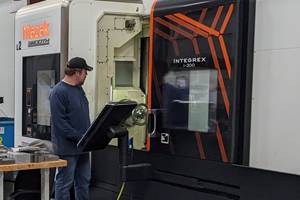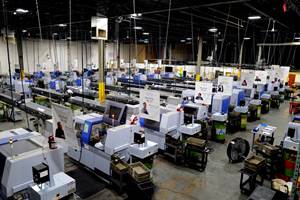Grob Goes Big on Universal Machining Centers
At an open house in Germany, Grob described its focus on the aerospace market for its line of universal machining centers.
Share






There were smiling faces all around in Mindelheim, Germany, last November 15 when Airbus landed its biggest-ever order with a $49.5 billion deal for 430 airliners, the same day Grob’s in-house exhibition kicked off there. Known for its flexible automotive production systems, the 6,000-employee company has been constantly growing its universal machining center business. Alexander Attenberger, head of Grob’s international universal machining center sales, said during the event that his segment of the company recently has been experiencing growth in the aerospace and tool and die industries.
While 35 percent of all globally sold automotive cylinder heads are said to be made on Grob’s production systems, which consist of modular machining centers and special-purpose machines interlinked with automation solutions tailored to each customer’s needs, the company has set its eyes on the aerospace industry and its universal machining center business, which currently accounts for 10 to 15 percent of global sales. “We certainly want to grow this product line and see huge potential in the aerospace and die and mold industries, as well as the growing importance of electromobility,” Mr. Attenberger said.
He believes that the technological transition in vehicle drive systems is not regarded as a threat to the company, but as a chance to develop a new market. Consequently, Grob acquired Italy-based DMG Meccanica, a manufacturer of machines and systems to produce stators for electric motors, alternators and generators in January 2017.
While the electromobility industry is yet to take off, Grob currently sells approximately 30 percent of its universal machining centers to the aerospace industry, 30 percent to automotive, 10 percent to die and mold, and 30 percent to other industries including medical, energy and general engineering.
Grob’s Mindelheim production facility, said to be Europe’s largest machine tool campus, includes 13 production halls and 600,000 square meters of floor space, which would take a five-kilometer walk to explore. The company also has a production facility in Bluffton, Ohio. As one of four production plants worldwide, the Bluffton plant generated an output (machines produced) of approximately $243 million in 2016/17 (out of a total of approximately $1.4 billion) and employed 480 people. “The United States is a very important market for us, and similar to global developments, we hope to see major growth in our universal machining center business coming from the aerospace and tool and die industries,” Mr. Attenberger said. Next to Asia (31 percent), North and South America are among the biggest markets for the company at 30 percent of sales followed by Europe at 21 percent.
Investing in Skills
To sustain Grob’s global growth, the company has established a paid apprenticeship program, which has been globally duplicated based on the parent-company model in Mindelheim. There, 320 apprentices choose from 10 programs to become machinists, electricians, designers and mechanical engineers, among other trades. 6 percent of the company’s global staff are apprentices, and the company says that the reason is simple: Employing apprentices is a smart move because they can be trained to develop exactly the skills and knowledge the company wants them to have. In addition to their on-the-job training, they attend off-the-job training at colleges or universities if they choose to pursue an academic career after they finish their 3.5-year apprenticeship program.
“The effort pays off,” Mr. Attenberger said. “Today, whether in Germany, China or the United States, manufacturers have no option other than developing talent in house. And most of our apprentices stay to follow a career within Grob after their apprenticeship, and many of them never leave.”
Related Content
6 Machine Shop Essentials to Stay Competitive
If you want to streamline production and be competitive in the industry, you will need far more than a standard three-axis CNC mill or two-axis CNC lathe and a few measuring tools.
Read More5 Tips for Running a Profitable Aerospace Shop
Aerospace machining is a demanding and competitive sector of manufacturing, but this shop demonstrates five ways to find aerospace success.
Read MoreInside the Premium Machine Shop Making Fasteners
AMPG can’t help but take risks — its management doesn’t know how to run machines. But these risks have enabled it to become a runaway success in its market.
Read More4 Commonly Misapplied CNC Features
Misapplication of these important CNC features will result in wasted time, wasted or duplicated effort and/or wasted material.
Read MoreRead Next
AMRs Are Moving Into Manufacturing: 4 Considerations for Implementation
AMRs can provide a flexible, easy-to-use automation platform so long as manufacturers choose a suitable task and prepare their facilities.
Read MoreLast Chance! 2025 Top Shops Benchmarking Survey Still Open Through April 30
Don’t miss out! 91ÊÓƵÍøÕ¾ÎÛ's Top Shops Benchmarking Survey is still open — but not for long. This is your last chance to a receive free, customized benchmarking report that includes actionable feedback across several shopfloor and business metrics.
Read MoreMachine Shop MBA
Making Chips and 91ÊÓƵÍøÕ¾ÎÛ are teaming up for a new podcast series called Machine Shop MBA—designed to help manufacturers measure their success against the industry’s best. Through the lens of the Top Shops benchmarking program, the series explores the KPIs that set high-performing shops apart, from machine utilization and first-pass yield to employee engagement and revenue per employee.
Read More





















